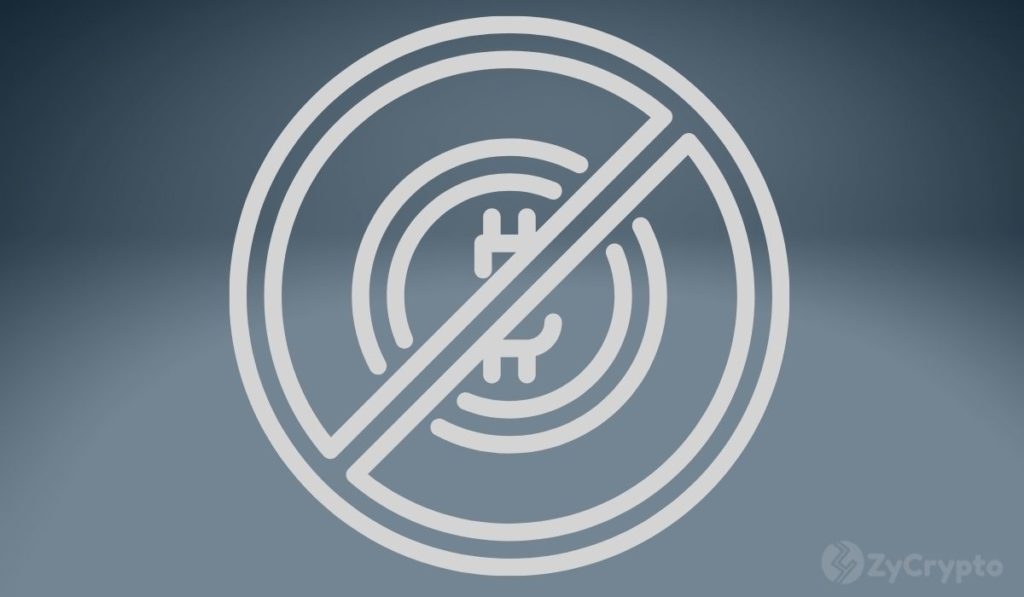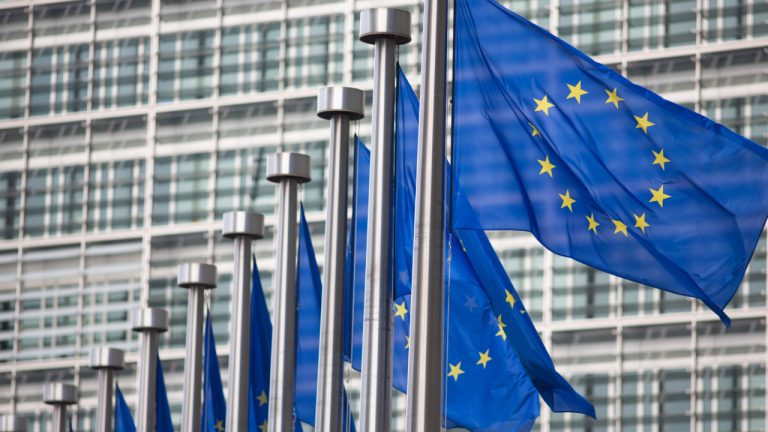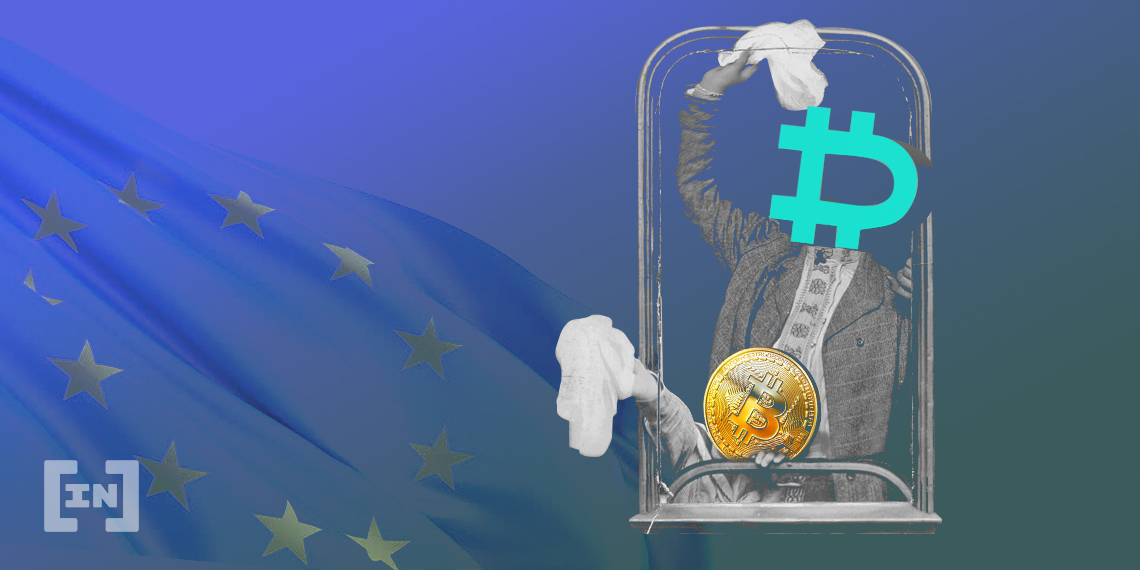Новости о Laundering European [ Фото новости ] [ Свежие новости ] | |
European Union Approves Crypto Anti-Money Laundering Rules
The European Union (EU) has agreed on anti-money laundering (AML) rules for cryptocurrencies that will oblige firms to check customer identities regardless of transaction size. The post European Union Approves Crypto Anti-Money Laundering Rules appeared first on BeInCrypto. дальше »
2022-6-30 15:00 | |
|
|
EU officials reach agreement on AML authority for supervising crypto firms
“We are putting an end to the wild west of unregulated crypto, closing major loopholes in the European anti-money laundering rules,” said European Parliament member Ernest Urtasun. дальше »
2022-6-30 00:32 | |
|
|
Lithuania to Ban Anonymous Wallets As Government Tightens Crypto Restrictions
Amid the geopolitical tensions, institutions within the European Union have been expediting processes to regulate cryptocurrencies. This is “in consideration of the increasing number of the crypto asset and service providers across Europe, global financial challenges, increased money laundering activities, and possible financing of terrorism associated with virtual currencies”, according to the Lithuanian government. Against this […] дальше »
2022-6-12 22:27 | |
|
|
Lithuania To Ban Anonymous Accounts As Gov’t Eyes Stricter Crypto Regulation
Lithuania is taking cryptocurrency regulation seriously. The institutions of the European Union are urged to expedite the process of regulating cryptocurrencies in consideration of the growing number of crypto-asset service providers in Europe, current global challenges, and the increased risk of money laundering and terrorism financing associated with virtual currencies. In an effort to combat money […] дальше »
2022-6-10 13:31 | |
|
|
Europe Compliance With AML Standards When Monitoring Crypto Low, Says Watchdog
MONEYVAL, Europe’s Anti-Money Laundering and Counter-Terrorism Financing (AML/CFT) watchdog, has prioritized monitoring the crypto industry, as well as “gatekeeper” professionals like attorneys and accountants, in European countries’ efforts to prevent money laundering. дальше »
2022-5-5 02:14 | |
|
|
Irish Banks Hail EU’s ‘Radical’ Anti-Money Laundering Push
Banks in Ireland have welcomed an upcoming reform of the European Union’s anti-money laundering regulations that will affect the crypto space. The Irish banking industry organization voiced support for the changes aimed at disrupting illicit transactions at the union level while calling them “radical. дальше »
2021-7-25 11:00 | |
|
|
EU Proposes Law to ‘Ensure Full Traceability’ of Crypto Transfers, Ban Anonymous Wallets
The European Commission has proposed legislation to “ensure full traceability of crypto-asset transfers, such as bitcoin,” in order to prevent and detect “their possible use for money laundering or terrorism financing. дальше »
2021-7-22 14:31 | |
|
|
European Union Seeks To End Anonymity Of Cryptocurrency Transfers By 2024
The European Commission (the executive arm of the European Union) has put forward new proposals that urge tighter regulation of anonymous wallets and cryptocurrency transfers in a sweeping effort to quell money laundering activities. дальше »
2021-7-21 12:14 | |
|
|
The European Union (EU) Introduces New Agency To Monitor Crypto And Curb Money Laundering
The EU is stepping up its anti-money laundering (AML) game and crypto monitoring with the introduction of a new agency. European Commission Proposes New Anti Money Laundering Regulator Documents seen by Reuters confirmed that the EU bloc is taking a tougher stand on money laundering, terrorist financing, and organized crime. дальше »
2021-7-9 19:39 | |
|
|
EU Mulls AML Authority and New Rules for Crypto Transfers, Documents Suggest
The European Union is preparing to set up an anti-money laundering agency to coordinate national supervisory authorities. According to a media report based on EU documents, the bloc also plans to impose new rules to increase transparency for cryptocurrency transfers. дальше »
2021-7-8 19:30 | |
|
|
Spain to Share Data of Users From Domestic Crypto Businesses With European Union Countries
The Spanish government doesn’t stop imposing its tough stance on cryptocurrencies, as another rule comes to strengthen the existing ones. A royal decree recently enacted aligns current regulations with the European Union’s directives regarding anti-money laundering (AML). дальше »
2021-5-5 02:30 | |
|
|
Mike Novogratz defends Bitcoin after ECB chief calls it 'funny business'
Not long after the President of European Central Bank called Bitcoin a “highly speculative asset” and that it was used to conduct money laundering, Mike Novogratz took to Twitter to criticize the The post Mike Novogratz defends Bitcoin after ECB chief calls it 'funny business' appeared first on AMBCrypto. дальше »
2021-1-15 23:30 | |
|
|
Bitcoin Logs Revenge Recovery as Lagarde Calls for Global Regulation
Bitcoin prices drifted higher on Wednesday, breaking away from bearish calls as Christine Lagarde raised the need to regulate it at the global level. In an interview with Reuters, the European Central Bank President said that Bitcoin is a highly speculative asset that has facilitated “some reprehensible activity,” such as money laundering, adding that “there […] дальше »
2021-1-14 22:58 | |
|
|
European Central Bank President Calls for Bitcoin Regulation
Bitcoin Conducts Funny Business Lagard stated that Bitcoin was a highly speculative asset: “which has conducted some funny business and some interesting and totally reprehensible money laundering activity. дальше »
2021-1-14 19:19 | |
|
|
Crypto exchange owner gets 10 years in prison for aiding scammers
The operator of a Bulgarian crypto exchange has received a 10-year prison sentence for money laundering in connection with an Eastern European cybercrime syndicate. дальше »
2021-1-14 15:59 | |
|
|
Bulgarian exchange owner convicted over auction fraud scheme
The owner of a Bulgarian crypto exchange has been convicted of providing money laundering services to a Eastern European cyber fraud syndicate. дальше »
2020-9-29 04:50 | |
|
|
Estonia Revokes License of Over 500 Crypto Companies to Curb Money Laundering
European Union member Estonia is now cracking down on cryptocurrency firms to attack money laundering in the country. Estonia has been in the spotlight for Europe’s biggest money-laundering scandal, about €200 billion were laundered from Denmark’s biggest financial institution Danske Bank’s Estonian branch from 2007-2015. дальше »
2020-6-12 18:07 | |
|
|
Dutch Bitcoin Companies Face Millions in “Unusual” AML Fees
As each member of the European Union turns the fifth anti-money laundering directive (AMLD5) into law, some member states are going above and beyond what has been recommended. In Holland,...The post Dutch Bitcoin Companies Face Millions in “Unusual” AML Fees appeared first on Crypto Briefing. дальше »
2020-4-16 09:17 | |
|
|
Crypto Exchanges Facing Greater Compliance Costs as AMLD5 Comes into Effect
With the European Union (EU) member states adopting the Fifth Anti-Money Laundering Directive (AMLD5), crypto exchanges in the region could see their compliance costs rise significantly. Meanwhile, financial regulators in the U. дальше »
2020-1-14 02:00 | |
|
|
With New Regulations, Europe’s Crypto Companies May Be Running Out of Options
European crypto companies are finding themselves in a changing regulatory environment. The new realities they have to deal with stem from the fifth edition of the European Union’s anti-money laundering directive. дальше »
2020-1-13 14:20 | |
|
|
Deribit Cryptocurrency Exchange Withdraws From Europe, Others Likely to Follow
The EU-based cryptocurrency exchange Deribit has announced it is moving to Panama amid new anti-money laundering regulations in the European Union that are coming into full force on Jan 10. The new, stricter rules coming into play will likely force out other European trading platforms going forward as well. дальше »
2020-1-12 18:15 | |
|
|
EU Countries Commence Crypto Regulations as Mandated by New Directive
The European Union’s 5th Anti-Money Laundering Directive mandates that member states start regulating crypto assets by Jan. 10. Crypto exchanges and custodial wallet providers are now covered by the same regulatory requirements as banks and other financial institutions. дальше »
2020-1-11 14:45 | |
|
|
What Does EU’s Fifth Anti-Money Laundering Directive (AMLD5) Mean For Crypto Exchanges?
European cryptocurrency firms are expecting a stricter regime of regulations as the 28 EU states are preparing to adopt the 5th Anti-Money Laundering Directive (AMLD5). The AMLD5 will burden small firms and force them to either merge or fold. дальше »
2020-1-11 20:57 | |
|
|
Deribit Crypto Derivatives Exchange Moves Operations to Panama in Response to EU’s 5AMLD
The Fifth Anti-Money Laundering Directive (5AMLD) set to be adopted by the European Union is slowly forcing out crypto firms operating in the region. Deribit, a digital currency derivatives exchange based in the Netherlands, is the latest to announce an exit from the EU. дальше »
2020-1-10 17:24 | |
|
|
Smoking Gun: Dutch central bank caught overreaching in local crypto businesses
The upcoming fifth Anti-Money Laundering Directive (AMLD5) within the European Union (EU) has already spelled the end for smaller crypto firms on the continent. In the latest, however, a secret memo between the Dutch Central Bank and the Minister of Finance indicates that crypto companies in Holland may face additional rules that go beyond what […] The post Smoking Gun: Dutch central bank caught overreaching in local crypto businesses appeared first on CryptoSlate. дальше »
2019-12-19 12:00 | |
|
|
ECB Builds a Proof of Concept using Corda to Explore Anonymity in CBDC
European Central Bank (ECB) is now exploring anonymity in central bank digital currencies that would safeguard the privacy of those users who conduct low-value transactions but ensure high-value transfers are subject to anti-money laundering (AML) checks. дальше »
2019-12-17 21:43 | |
|
|
New European AML Regulations Look Set to Impact Cryptocurrency
New anti-money laundering (AML) regulations are coming into force by January 10 in Europe. The rules, which address cryptocurrency companies for the first time, look set to have a large impact on the industry. дальше »
2019-12-17 16:55 | |
|
|
Europe: Banks May Hold and Sell Bitcoin Starting From 2020
According to a new bill on the Fourth Money Laundering Directive drafted by the European Union (EU), banks could be authorized to offer digital assets services including storage for customers. Germany would likely be the first nation to adopt the proposal. дальше »
2019-11-30 18:00 | |
|
|
Facebook faces EU grilling over Libra ‘cryptocurrency’ after losing PayPal backing
As Facebook deals with the loss of PayPal‘s backing for its ‘cryptocurrency‘ Libra, the tech giant must now get ready to answer EU regulators’ questions about the potential risks posed by the project. дальше »
2019-10-7 12:07 | |
|
|
Dutch Central Bank Orders Crypto “vulnerable to financial crime” Companies to Register
De Nederlandsche Bank to regulate crypto companies starting from January 10, 2020 The move came under the fifth European anti-money laundering directive De Nederlandsche Bank would begin regulating companies that offer cryptocurrency services, starting from January 10, 2020, announced the Dutch central bank on Tuesday. дальше »
2019-9-3 18:59 | |
|
|
Dutch central bank has new rules for crypto, says it’s ‘vulnerable to financial crime’
The Dutch central bank has today announced it must begin supervising cryptocurrency companies (including wallet providers) under the fifth European anti-money laundering directive, which came into effect in July. дальше »
2019-9-3 13:07 | |
|
|
Spanish Police: Bitcoin ATMs Highlight Flaws in EU Money Laundering Rules
Following a Spanish investigation into a gang’s recently-busted money laundering operation, the nation’s police force claim to have exposed gaps in the European Union’s regulations designed to prevent money laundering. дальше »
2019-7-12 02:00 | |
|
|
EU Requests Malta to Increase AML Levels to Match The Growth of The Cryptocurrency Market
Malta, one of the most friendly jurisdictions for Bitcoin (BTC), cryptocurrencies and blockchain technology, is currently being questioned by the European Union (EU) for its friendly KYC and AML policies it has. дальше »
2019-6-6 23:09 | |
|
|
European authorities swoop on bitcoin mixing service
Dutch authorities have seized the servers and domain of Bestmixer.io, one of the most popular cryptocurrency mixing services. Bitmixer is accused of money laundering and ‘dusting attacks’, where tiny amounts of cryptocurrency are sent to thousands of wallets without recipient consent. дальше »
2019-6-1 22:00 | |
|
|
Dutch Authorities Shut Down Bestmixer
The Dutch Financial Intelligence and Investigation Service (FIOD) has shut down cryptomixing site Bestmixer. io. According to local media, Dutch authorities moved to shut down the site on May 22, 2019, as part of a joint operation with police agencies from several European nations, including France, Latvia and Luxembourg. дальше »
2019-5-22 21:13 | |
|
|
Despite Industry Pushback, G20 May Impose Stricter KYC Policy on Exchanges
It looks as if cryptocurrency service providers will have to adopt stricter know-your-customer (KYC) policies all across the world — and not everyone is happy about that. дальше »
2019-5-13 21:33 | |
|
|
Crypto Hacks Are on Track to Eclipse $1 Billion in Lost Funds This Year
Crypto security and intelligence firm CipherTrace has published its Q1 2019 Cryptocurrency Anti-Money Laundering Report, revealing that exchange platforms all over the world have lost nearly $400 million as a result of hacks and thefts. дальше »
2019-5-3 17:40 | |
|
|
Finland’s new cryptocurrency regulation forces AML on industry
Cryptocurrency businesses in Finland will now have to register with the country’s financial watchdog. As a result of the ACT OF VIRTUAL CURRENCY PROVIDERS, which comes into force on May 1, businesses will have to adhere with statutory requirements, including holding and protecting client money, segregating client money and own funds, and ensuring compliance with anti-money laundering regulation. дальше »
2019-4-29 17:31 | |
|
|
CySEC to Use EU’s Fifth Anti-Money Laundering (AML) Directive (AMLD5) To Govern Cryptos at a National Level
The Fifth Anti-Money Laundering (AML) Directive, implemented originally by the European Union (EU), became active in July of 2018. The directive made it possible for the EU’s regulators to monitor crypto-related businesses and service providers, based on the intention of reducing the risk of money laundering and terrorism financing. The directive has now been transposed […] дальше »
2019-2-20 01:02 | |
|
|
LocalBitcoins Issues a Statement on Upcoming Anti-Money Laundering Regulations and Compliance
Peer-to-peer cryptocurrency exchange LocalBitcoins recently issued a statement about anti-money laundering laws and compliance with the 5th AML Directive of the European Union. The company said that it wants to work on compliance while building trust. дальше »
2019-2-11 15:29 | |
|
|
European Banking Regulators Call for Unity in Crypto Regulations
Last week, two of the largest banking regulators within the European Union released reports calling for uniformity in the regulations of crypto assets and Initial Coin offerings (ICOs) across the continent. дальше »
2019-1-16 01:54 | |
|
|



























